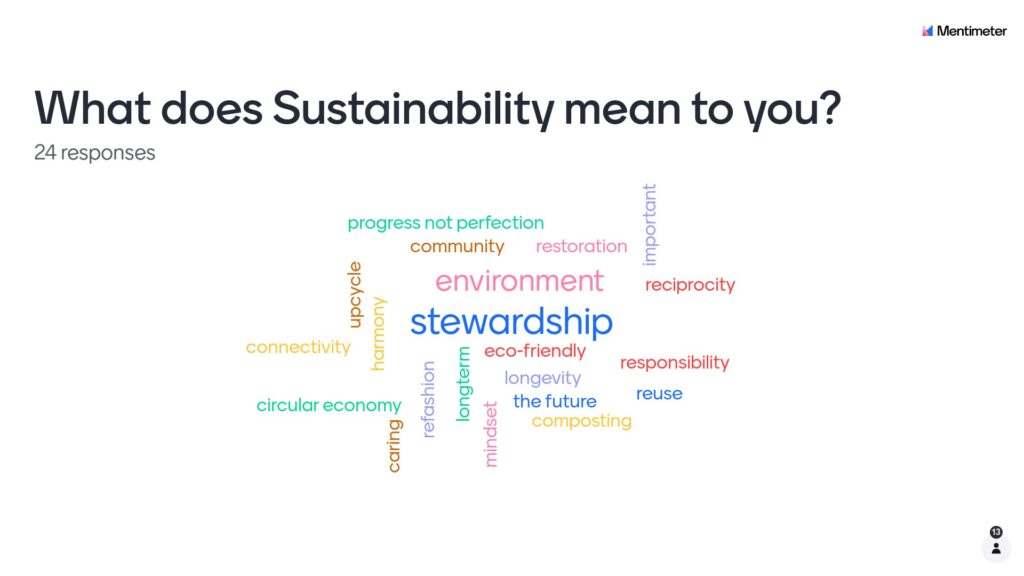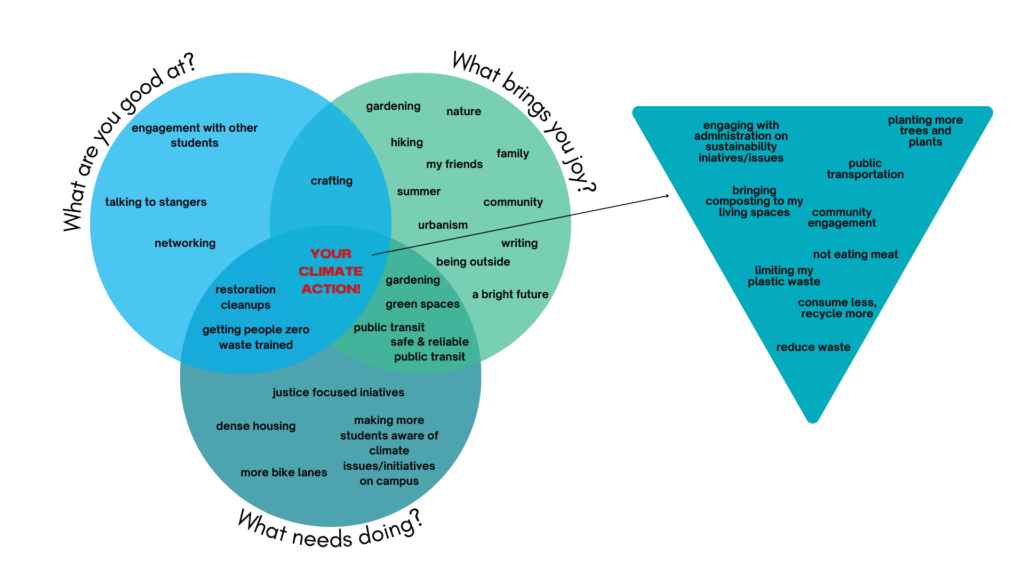
A snapshot of the word cloud at the end of the event. Participants could submit 1-3 words to summarize Sustainability.
The smell of coffee and donuts in the air, a gentle Nintendo music backdrop, and a projected word cloud greeted university students and staff alike on Tuesday, April 9th, as the LSA Year of Sustainability hosted a “Sustainability Stories Pop-up” event in the LSA Building’s Multipurpose room. Over the course of the two hour drop-in event, a little over a dozen members of the U-M community came through to engage with a mix of the three activities offered.
In addition to the word cloud, participants could choose to engage with one of three Climate Action Venn Diagrams drawn on whiteboards around the room. These Venn diagrams, a concept created by climate activist Ayana Elizabeth Johnson, aim to help individuals recognize the intersection between what they enjoy doing, what they’re good at, and what work needs to be done to meaningfully address the climate crisis. The responses gathered during the event are summarized below:

For the third and final opportunity to engage, some participants took a moment to share their thoughts on record and took a few minutes to verbalize what comes to mind for them when they think of sustainability. These responses are listed below:
“I think sustainability means anything you can do that would benefit your environment and your surroundings in a positive way. That could be using a compost bin, recycling properly, or it could also mean going out and helping after a big game day picking up trash or planting a tree in your backyard.”
– Mithun Vidhyaponrha, U-M Student
“I think sustainability is really important. I think when we look at sustainability, like around campus, I think we need to be reducing waste. And I’ve definitely seen that in like the freshman dining halls where they’re using smaller plates, which is reducing how much food people are actually putting on their plates. And then we’re actually reducing the amount of food people are wasting. I also think that something that we can be doing more about is I know that in different Bio Labs and Orgo labs, they use a lot of plastics. Yeah. And I think that we can reduce that in some ways as well. And then also, going on from that just reducing waste in general, during campus events, and making sure that we’re maybe using more reusable plastics and reusing items more than just using those one time plastics.”
– Erin Klein, U-M Student
“I guess like, for me, sustainability means kind of [being] a bit more conservative in my own terms. When I think of sustainability, I think of conservation, climate change, going green, like Earth Day. That’s the kind of thing [that comes to mind] when I think of sustainability. I don’t have any other words to add besides that. I’m not that much of a expert., but I think that’s what I would define it as.“
– Elizabeth Li, U-M Student
“I think sustainability is finding a way that is exciting and enjoyable to celebrate and help the earth while still, like resonating with your own values. So for me, I haven’t eaten meat in seven years, and all that has been driven by sustainability. And I think like, going out and appreciating the Earth can help you become more sustainable by building that relationship.”
– Megan Young, U-M Student
“I feel like sustainability, as a meaning, has changed over time for the most part. [It] obviously started as like, preserving for the next generation. But I also like the idea of preserving what we have now for ourselves as well. Generations before us have worked hard to preserve it, and some have not. But I think we owe it to ourselves now, as people living in this moment, to also work for ourselves in the environment, but also keeping [in mind] the indigenous principles of seven generations after us. But they also think of the seven generations before us and how in tandem, Time is moving. So what happened seven generations before us is happening now to us. And as well, what we’re doing now is going to affect seven generations after us. But that also means that sustainability isn’t just for the humans of the Earth, it’s all non humans as well…living beings. So the grass to the worms and all the pretty birds, and our…Michigan Wolverines that are never seen, but they’re out there. All of the animals that move on Earth, and everything that creates oxygen for us, the trees, and all those crazy natural processes that we don’t think of that keep us alive today. And just being appreciative of what we have, and what we’re going to have, and what we’ve had in the world, and just moving forward as equitable as possible, not just for the rich people that are doing this work, or the people that are working in sustainability, but for the people that don’t necessarily have the means or abilities to work in sustainability or live a sustainable lifestyle, however you want to take that, but are just living day to day. I think we owe it to all people and all non-human peoples on earth.”
– Jenna Steele, U-M Staff
“To me, not only is sustainability environmentally related, but also [it means] engaging with communities to improve quality of life for all people, especially those affected more closely by climate change, such as you know, energy justice. Through engineering, I’m a problem solver. So sustainability to me is working with communities to address the problems they say they face, effectively, and finding solutions that last forever.”
– Katie Bailey, U-M Student
As one piece of the Year of Sustainability’s programming portfolio, the event sought the LSA community’s opinion on sustainability. The team benefitted from people’s willingness to have open and honest conversations about what it means to engage in this work, in both the personal day-to-day sense, as well as the big picture. In short, a small but mighty group of people responded.
Based on this event, the Year of Sustainability team is in early talks with Planet Blue Ambassadors over expanding the pop-up conversation style of the event to a larger audience and venue such as the Diag during Earth Fest next fall semester. If you don’t want to wait that long before exploring more sustainability stories like these, consider checking out the Climate Diaries project in the meantime.
Would you like to share your Climate Action Venn Diagram with us? Perhaps tell us what Sustainability means to you? Contact sustainable-lsa@umich.edu with any questions or submissions.

